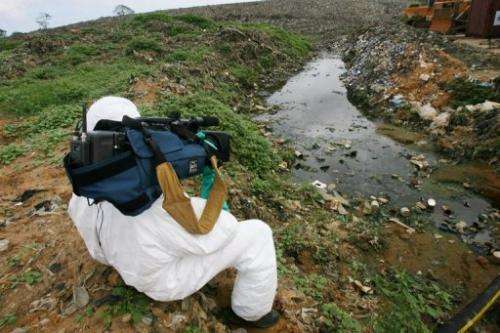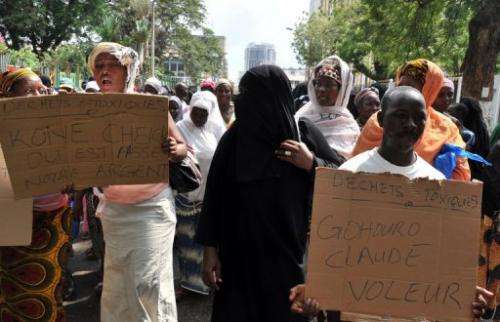A man at the Akouedo dump in Abidjan films the toxic waste dumped in 2006 by the Probo Koala a Panamanian-registered cargo ship operated by Trafigura. Britain must launch a criminal probe into the multinational firm Trafigura and its role in the 2006 deadly dumping of toxic waste in Ivory Coast's economic capital Abidjan, Amnesty International and Greenpeace said Tuesday.
Britain must launch a criminal probe into the multinational firm Trafigura and its role in the 2006 deadly dumping of toxic waste in Ivory Coast's economic capital Abidjan, Amnesty International and Greenpeace said Tuesday.
Ivory Coast says the toxic waste, which came from the Probo Koala ship chartered by Trafigura, killed 17 people and caused thousands of cases of poisoning.
"The UK government must begin a criminal investigation into Trafigura's role in the dumping, as the UK arm of the Trafigura corporate group took many key decisions that led to the disaster," Greenpeace and Amnesty said as they released a 250-page report into the disaster.
The Switzerland-based multinational shipping company denies any link between the waste and casualties and criticised the report's findings.
File photo shows people contaminated by the dumping of toxic waste by the Probo Koala, a Panamanian-registered cargo ship operated by Trafigura in Ivory Coast in 2006, protest in Abidjan. In 2006, caustic soda and petroleum residues on board the Probo Koala were prevented from being offloaded for treatment in the port of Amsterdam and redirected to Abidjan, where they were dumped on waste tips.
"The report contains significant inaccuracies and misrepresentations. The report oversimplifies difficult legal issues," Trafigura said in a statement.
On July 2, 2006, caustic soda and petroleum residues on board the Probo Koala were prevented from being offloaded for treatment in the port of Amsterdam and redirected to Abidjan, where they were dumped on city waste tips.
The waste, slops from the cleaning of fuel transportation tanks, had been pumped back into the vessel after it was found to be more dangerous than previously thought and a Dutch waste treatment company demanded a higher price, which Trafigura declined to pay.
Amnesty and Greenpeace criticised the decision to reload the waste, calling it "a serious violation of Dutch legal obligations".
"People in Abidjan were failed not just by their own government but by governments in Europe who did not enforce their own laws," said Salil Shetty, Amnesty's secretary general.
A Dutch court found Trafigura guilty of illegally exporting waste from the Netherlands, but prosecutors did not consider what happened afterwards in Ivory Coast, according to the report.
"It is not too late for justice to be served, for the people of Abidjan to be given full information about what was dumped and for Trafigura to pay for its crimes. Only then can we hope to avoid any repetition of this kind of disaster," said Greenpeace international executive director Kumi Naidoo.
The report also casts doubt on a legal agreement in Ivory Coast that allows Trafigura to avoid prosecution there, and calls on Ivory Coast to make sure victims are fully compensated.
(c) 2012 AFP

























